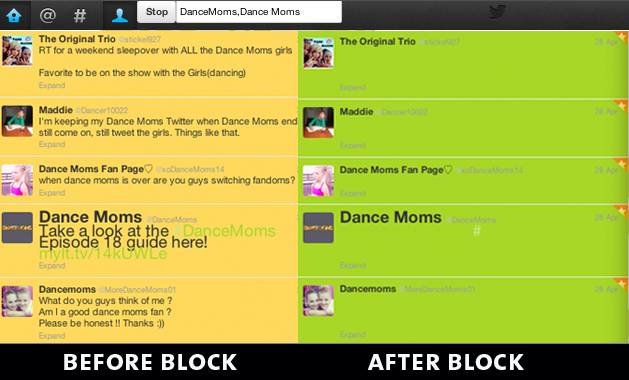
Imagine you forget to watch a new episode of Game of Thrones the night it airs. Even if coworkers stay mum about important plot points, Twitter is abuzz with spoilers. Fortunately, there’s Twivo, a new program that allows Twitter users to censor their feeds from mentioning a certain TV show (and its characters) for a set time period. Jennie Lamere, a 17-year-old girl, invented the software last month—and won the grand prize at a national coding competition where Lamere was the only female who presented a project, and the only developer to work alone. Internet: Meet the reason we need more women in tech.
Lamere is a high school senior from Nashua, New Hampshire, who likes building robots, hiking, and entering “hackathon” competitions. At her all-girls school, the Academy of Notre Dame in Massachusetts, she’s the only student participating in these sorts of events. Hackathons (which have nothing to do with illegal hacking) bring together programmers, developers, and designers, who compete to code an innovative new program in a limited amount of time. Lamere entered the TVnext Hack event, put on by the ad agency Hill Holliday in partnership with Mashery, in Boston on April 27 along with about 80 other competitors—all of them male, according to Lamere and one of the judges. (Mike Proulx, a spokesman for the event, says he believes other women participated, but didn’t present completed projects.)
The gender breakdown of the event “was a little weird,” Lamere tells Mother Jones. “But it’s something that I’m used to at these things.” Eliot Van Buskirk, an attendee from Evolver.fm, confirms that “the only other females in attendance, that I saw anyway, were an organizer, two camerawomen, a caterer, three judges, and a participant’s wife.”
“We marketed the hackathon to the entire developer community, and the demographics of the participants mirror the demographics of the community itself,” Proulx, the event spokesman, tells Mother Jones. “We had a diverse demographic, but obviously the majority of the people were male.” In addition to being the only woman, Lamere was the only solo competitor in the hackathon—every other project was created by a team, Proulx says.
Lamere took her subcategory, “best use of sync-to-broadcast” and then the overall “best in show,” which earned her swag including iPad minis and an Apple TV. She beat out professional developers sent by the event’s sponsors, including ESPN, the Echo Nest, and Klout. She came up with the idea for Twivo the night before the competition, and it took her 10 hours and 150 lines of code to complete. It works as an extension to the Google Chrome browser: A user can type in the key words she would like to block, and for how long, and make those Tweets disappear. In the screenshot below, Twivo has blocked out Twitter references to one of Lamere’s favorite TV shows, Lifetime’s Dance Moms (the Twitter accounts that are more prominent, like the official Dance Moms account, automatically appear larger.) Once a user is done blocking the show, the Tweets reappear. Lamere says the program is still in demo form and won’t be ready for another two or three weeks, but she’s already been approached by Furious Minds, a tech company that intends to help her market the final product.

“We’re always interested in the convergence between TV and social media, and Jen’s hack was awesome, not to mention she did the entire thing herself,” says Ashley Swartz, CEO and founder of Furious Minds. Swartz, who was one of the judges for the competition. The other finalists included a self-described “bunch of guys who live together” who made a program that lets you bet on what’s going to happen on a TV show, a team that “likes drinking and likes watching sports,” and two fathers designing learning programs for their kids.
Hackathons have been around for years, but organizers still haven’t figured out how to get a balanced gender ratio. According to Girls Who Code, an organization that aims to provide computer science education and exposure to 1 million young women by 2020, women only represent 12 percent of computer science graduates, down from 37 percent in 1984. “Boys and girls are neck and neck academically in school until puberty, when girls tend to veer off from tech,” Swartz says. “Jen is going to be the only chick in the room for a very long time, and my responsibility is to give her opportunities that I didn’t have.”
When Lamere and I spoke, she was in the middle of finals week, taking AP chemistry, calculus, and computer science. She’s attending the Rochester Institute of Technology in the fall, intending to major in software engineering. She hopes to some day work for Google. Some of the other projects she’s “hacked” in her short career include an app that lets you enter your city and music tastes and find out if bands you might like are touring nearby, and “Bohemian Harpsichord,” a program that turns Bohemian Rhapsody into a musical instrument, which she worked on with her dad, who is also a developer (her two older sisters and brother are not). She says that after creating Twivo, she took the project back to her computer science class and walked her classmates through the code. “Hopefully the other girls will come to the next hackathon!”
Update: Mike Proulx, the spokesman for the event, told Mother Jones on Thursday that there were other solo participants who presented hacks. He also said there were four other women registered for the hackathon, but again confirmed Jennie was the only one to present a completed project.















